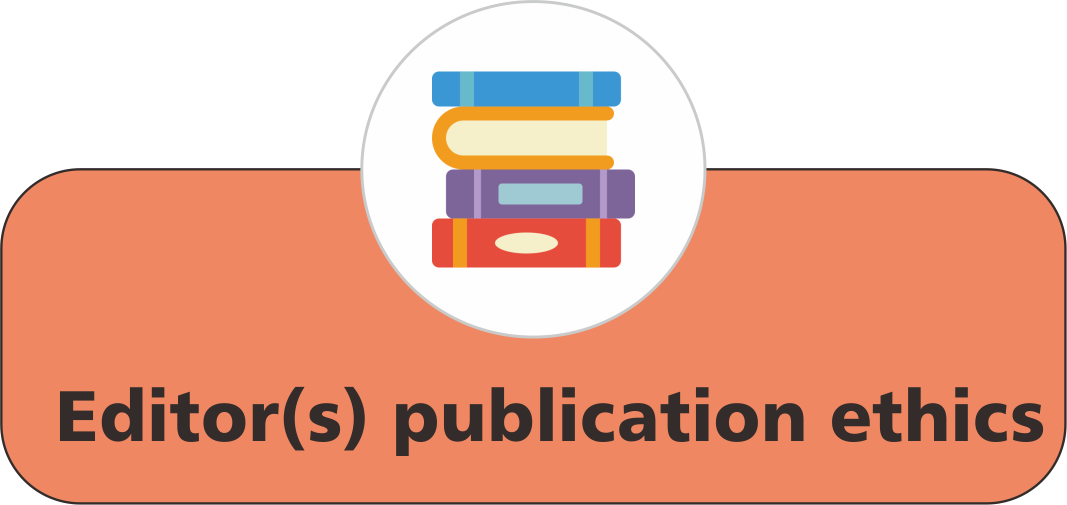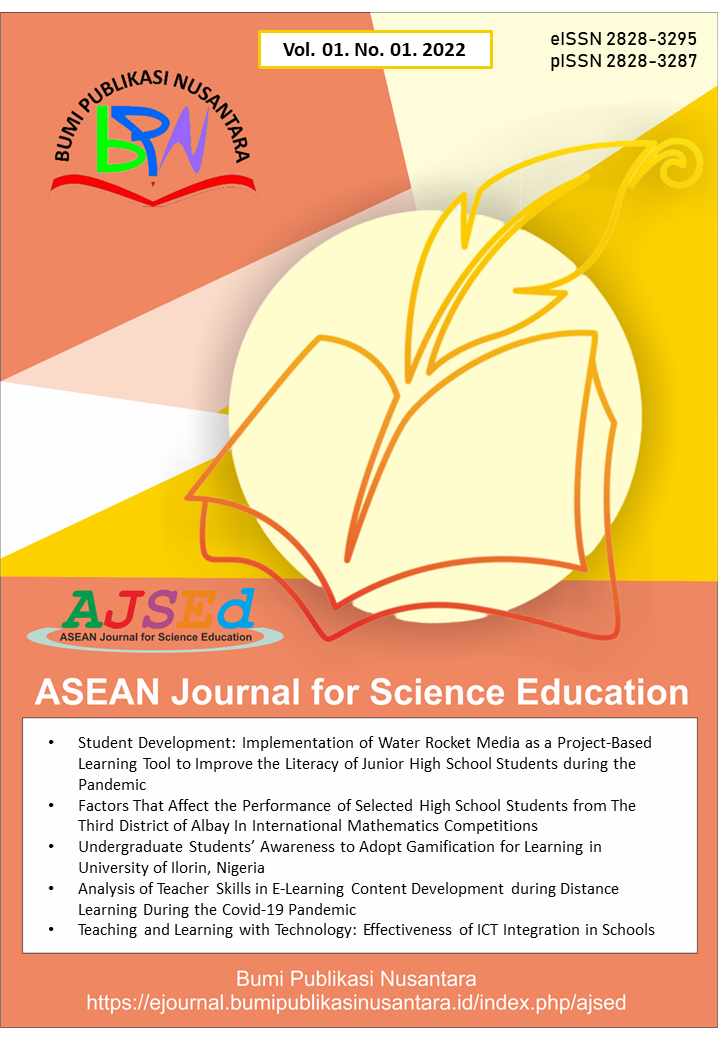[RETRACTED] Towards Designing Technology for Classroom Role-Play
 ), Hakimova Muhabbat(2),
), Hakimova Muhabbat(2),
(1) Tashkent State University of Economics
(2) Tashkent State University of Economics
 Corresponding Author
Corresponding Author
Abstract
==========================================================
Available online: 19 Febuary 2024
This article has been retracted by ASEAN Journal for Science Education Editorial team, following clear correspondence and confirmation with authors regarding plagiarism (exact replica).
The paper is retracted from 17 April 2024.
==========================================================
Classroom role-play is an interactive learning technique with a long history of success, but current attempts to augment it with technology are implemented in ways that limit the interactions that make this technique successful. For example, digital role-play games often engage individual students at a computer, rather than creating rich social interactions among students. To design interactions that better support the core aspects of classroom role-play, we conducted interviews with teachers. We also interviewed role-play gamers to discover how traditional RPG techniques and technology can be used to enhance classroom role-play. The purposes of this study were to: (i) explore the reasons instructors choose role-play for learning, such as giving students practice opportunities; (ii) identify barriers to instructors using classroom role-play activities, such as time constraints and student discomfort; (iii) report issues around integrating technology, such as the benefit of reducing cognitive load and the threat of distraction; and (iv) highlight two areas where insights from role-playing games can support the design of effective interactive learning systems for classroom role-play, namely by providing methods for emphasizing group success over individual achievement and by preserving the spirit of the experience
Keywords
References
Amoako-Gyampah, K., and Salam, A. F. (2004). An extension of the technology acceptance model in an ERP implementation environment. Information & Management, 41(6), 731-745.
Armstrong, E. K. (2003). Applications of role-playing in tourism management teaching: An evaluation of a learning method. Journal of Hospitality, Leisure, Sport and Tourism Education, 2(1), 5-16.
Barab, S., Zuiker, S., Warren, S., Hickey, D., Ingram‐Goble, A., Kwon, E. J., and Herring, S. C. (2007). Situationally embodied curriculum: Relating formalisms and contexts. Science Education, 91(5), 750-782.
Bowes-Lyon, L. M., Richards, J. P., and McGee, T. M. (2010). Socio-economic impacts of the Nanisivik and Polaris mines, Nunavut, Canada. Mining, Society, and a Sustainable World, 371-396.
Bowman, S. L., and Ilieva, A. (2012). Role-playing. International Journal of Role-Playing, 1-93.
Chi, M. T., and Wylie, R. (2014). The ICAP framework: Linking cognitive engagement to active learning outcomes. Educational Psychologist, 49(4), 219-243.
Cropper, A., Evans, R., and Law, M. (2020). Inductive general game playing. Machine Learning, 109, 1393-1434.
Davis, D. M. (1990). Portrayals of women in prime-time network television: Some demographic characteristics. Sex Roles, 23, 325-332.
Delwiche, A. (2006). Massively multiplayer online games (MMOs) in the new media classroom. Journal of Educational Technology and Society, 9(3), 160-172.
Gatsakou, C., Bardis, N., and Drigas, A. (2021). Role playing vs RPGs as teaching strategies in educational procedure. Technium Social Sciences Journal, 26, 186.
Heidbrink, S., Knoll, T., and Wysocki, J. (2014). Theorizing religion in digital games perspectives and approaches. Online-Heidelberg Journal of Religions on the Internet, 5, 5-50.
Horn, I. S., and Little, J. W. (2010). Attending to problems of practice: Routines and resources for professional learning in teachers’ workplace interactions. American Educational Research Journal, 47(1), 181-217.
Kokotsaki, D., Menzies, V., and Wiggins, A. (2016). Project-based learning: A review of the literature. Improving Schools, 19(3), 267-277.
Kourilsky, M. (1993). Economic education and a generative model of mislearning and recovery. The Journal of Economic Education, 24(1), 23-33.
Ku, H. Y., Tseng, H. W., and Akarasriworn, C. (2013). Collaboration factors, teamwork satisfaction, and student attitudes toward online collaborative learning. Computers in human Behavior, 29(3), 922-929.
Lean, J., Moizer, J., Towler, M., and Abbey, C. (2006). Simulations and games: Use and barriers in higher education. Active Learning in Higher Education, 7(3), 227-242.
Mendes, I. (2019). Inclusion and political representation in peace negotiations: The case of the Colombian victims’ delegations. Journal of Politics in Latin America, 11(3), 272-297.
Montfort, N., and Short, E. (2012). Interactive Fiction Communities: From peservation through promotion and beyond. Dichtung Digital. Journal Für Kunst und Kultur Digitaler Medien, 14(1), 1-14.
Montola, M. (2008). The invisible rules of role-playing the social framework of role-playing process. International Journal of Role-Playing, 1, 22-36.
Othlinghaus-Wulhorst, J., and Hoppe, H. U. (2020). A technical and conceptual framework for serious role-playing games in the area of social skill training. Frontiers in Computer Science, 2, 28.
Paschall, M., and Wüstenhagen, R. (2012). More than a game: Learning about climate change through role-play. Journal of Management Education, 36(4), 510-543.
Rao, D., and Stupans, I. (2012). Exploring the potential of role play in higher education: Development of a typology and teacher guidelines. Innovations in Education and Teaching International, 49(4), 427-436.
Rese, A., Kopplin, C. S., and Nielebock, C. (2020). Factors influencing members’ knowledge sharing and creative performance in coworking spaces. Journal of Knowledge Management, 24(9), 2327-2354.
Slota, S. T., Ballestrini, K., and Pearsall, M. (2013). Learning through operation lapis—a gamevbased approach to the language classroom. Language, 36, 36-38.
Steinkuehler, C. (2006). The mangle of play. Games and Culture, 1(3), 199-213.
Tuckman, B. W. (1964). Personality structure, group composition, and group functioning. Sociometry, 469-487.
Yen, Y. C., Hou, H. T., and Chang, K. E. (2015). Applying role-playing strategy to enhance learners’ writing and speaking skills in EFL courses using facebook and skype as learning tools: A case study in Taiwan. Computer Assisted Language Learning, 28(5), 383-406.
Article Metrics
Abstract View : 476 times
: 476 times Download : 310 times
Download : 310 times
Refbacks
- There are currently no refbacks.
Copyright (c) 2024 Bumi Publikasi Nusantara

This work is licensed under a Creative Commons Attribution-ShareAlike 4.0 International License.







